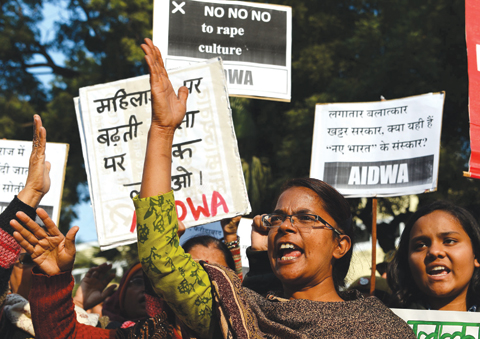Indian states sign up to 'Justice For Her' initiative - Police extort transgender sex workers
 NEW DELHI: Indian activists shout slogans during a protest in New Delhi against the gang-rape of two schoolgirls in the neighboring state Haryana. Amid growing pressure on Indian police over the handling of rape cases, dozens of new support centers for women victims of sexual violence are to be opened across the country under a scheme announced yesterday. —AFP
NEW DELHI: Indian activists shout slogans during a protest in New Delhi against the gang-rape of two schoolgirls in the neighboring state Haryana. Amid growing pressure on Indian police over the handling of rape cases, dozens of new support centers for women victims of sexual violence are to be opened across the country under a scheme announced yesterday. —AFPNEW DELHI: Dozens of support centers for women victims of sexual violence are to open across India under a scheme announced yesterday, as pressure grows on police over their handling of rape cases. Police in four states have signed up to the "Justice For Her" initiative, with Sheffield Hallam University in Britain. Fifty-one centers, which aim to improve access to justice for victims, will be opened in Madhya Pradesh state which has the country's worst record for rape cases. The New Delhi region and the northern states of Haryana and Punjab have also signed up.
Lawyer Helena Kennedy, a member of Britain's House of Lords upper chamber, said the initiative could be a "watershed moment" in India. "The first step towards tackling this issue is giving sanctuary for those who have been victims of these terrible crimes, whilst also providing the relevant authorities with the skills and power to address the problem with confidence," Kennedy said when launching the project in New Delhi.
India has been in the global spotlight since the 2012 gang rape and murder of a woman on a New Delhi bus sparked angry protests. The number of reported rape cases has grown since then. The government has promised to speed up trials and set up hotlines but rights groups say authorities are still not doing enough. The apathetic response of police after the rape of a 19-year-old student by four men outside a Madhya Pradesh railway station in November sparked a new outcry. Police initially accused the woman of inventing the story and mocked her. Four officers have since been sacked.
Madhya Pradesh has the worst record for sexual assaults among India's 29 states, with nearly 5,250 cases reported in 2016 out of the 39,000 nationally. The support centers will provide medical attention, police liaison, legal advice and counseling. A training program will aim to make police more sensitive in handling sexual assault and improving access to justice. Many victims have complained of being coerced by police, who either urged them not to file cases or refused to register complaints. For many victims, justice remains distant as trials drag on for months and often years. Some accused have bought freedom by bribing officials or threatening victims.
Police extort transgender
Police in India routinely extort female transgender sex workers, which pressures them to earn more by engaging in unsafe sex that increases the risk of disease, researchers say. Gender minorities need more protection and police need sensitivity training, said a report by the Chennai-based Centre for Sexuality and Health Research and Policy (C-SHaRP) and the Mumbai-based Humsafar Trust. "We found that transgender women have poor earnings and they have to share that too with the police and ruffians who exploit them," said Venkatesan Chakrapani, a doctor who chairs C-SHaRP and has researched the transgender community for years. "Because of this extortion, they try to earn more and do not insist their customers use condoms," he said yesterday.
The study, published in late 2017, was based on interviews with 300 transgender women working in the sex industry in major Indian cities. The results showed that they face a high risk of abuse and sexually transmitted diseases, including HIV. The HIV prevalence among India's transgender community is estimated at 7.5 percent, much higher than the country's average of 0.3 percent, government data shows. Transgender women fear police action under a British colonial-era law that prohibits "carnal intercourse against the order of nature with any man, woman or animal", which is widely interpreted to refer to homosexual sex.
"Biologically, most transgender women are born as males, so it is not clear whether they could be penalized for having sex with a man," Chakrapani said. India's 2011 census recorded half a million transgender people, but campaigners estimate the number at about 2 million. Less than half are literate and even fewer have traditional jobs, according to the census. In a landmark 2014 judgment, the Supreme Court granted legal status to transgender people and made them eligible for quotas in employment and educational institutions.
However, social bias continues and they are denied education and jobs, forcing many of them into the sex industry, campaigners say. "If they are begging or are engaged in sex work, they face more abuse from the police," said Shubha Chacko, executive director of the Solidarity Foundation, which helps transgender people find jobs. Doley Barman, director of the National Police Academy, said police training includes "sensitization modules on dealing with the transgender community", as well as visits to areas where trainees can interact with transgender people.- Agencies










